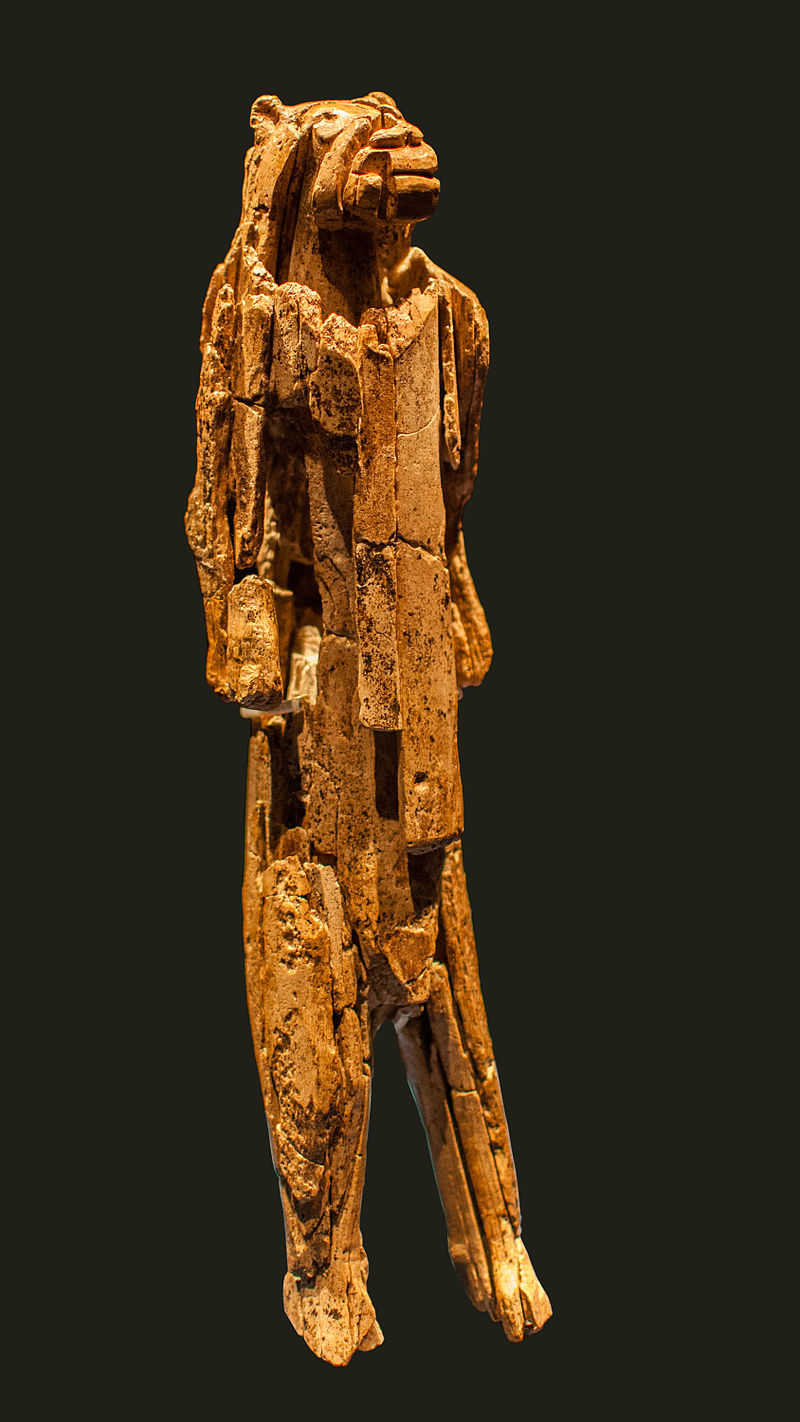Teratology: on Monsters in Fiction.
Episode 9, “The Hounds”, is the episode I commonly think of as “mine” (the finale, of course, has my grubby fingerprints all over it, but that’s a discussion for another time,) just as Episode 8, “Cassandra”, belongs to Edgar.
Part of why I say that is because it showcases the closest thing we have to a traditional “monster” in the show — the Hounds of Hell themselves, which were introduced at the end of “The Crooked Road” (which is turning out to be possibly our most folkloric episode, in retrospect.) I say that this makes it my baby if only because I dearly, dearly love a good monster.
Part of this is sheer childish love of fictional depictions of things that squirm and loom, but I feel that my affection goes beyond that. I love monsters in fiction because, more than anything else, a monster is a metaphor with teeth.
Pictured here, next to this passage, is the Löwenmensch of Holstein-Stadel, a 35,000-40,000 year old statue found in northern Europe that is the first example of a depiction of a hybrid creature. We don’t know if it was a cult object, we don’t know if it served some shamanic purpose, we don’t know if it was a storytelling aid. We just know that, some 1,500 generations ago, some person who lived in an itinerant society we know nothing about, took the time to make this figurine. Its significance, within that culture, is lost to us: but we recognize a monster when we see one — a creature that marries the ferocity of the lion with the stature and capabilities of a human.
Monsters, from the very first one we have here, are about transgression. They are about boundaries we thought were impermeable being shown to be porous: not a wall to hold the world in but a horizon to show the limits of or understanding. I can summarize, but perhaps it’s best to just point you to one of my favorite essays on the topic, “M.R. James and the Quantum Vampire” by China Miéville.
My favorite monsters are the ones that haven’t yet been solidified in the minds of an audience. This isn’t to say I have never enjoyed a vampire story, or that I haven’t ever discussed a “zombie plan” with friends in jest, or the like. No, it just means that when I want something numinous, I don’t want to be able to attach a name to it. John Carpenter’s The Thing is going to get under my skin way more easily than another retreading of Dracula, even if Dracula is great. It’s right there in the title — we cannot articulate the former, we cannot easily imagine what the world presents itself like to it or them (though Peter Watts made a stellar shot at it in Clarkesworld that one time), but there are multiple editions of Roleplaying games about being vampires.
It’s about being confronted with something that the mind struggles to process, a sort of monumental horror-image writ small.
The story of Perdition’s Teeth is about many things — Edgar and I talked about it, several times while making dinner, as being an attempt made at an American Epic (in the sense of being our attempt to tell an American story that followed the model of the Homeric epic.) There are many themes layered into that, but our tendency towards leftist politics was the seed from which the hounds sprung: our villain speaks to the audience through the radio, narrating their actions as they happen, omnipresent as ECHELON; he offers strange powers to captains of industry and agents of the law; Rauv, the radio-man, is a sigil representing these things, but he is not our monster.
His servants, the Hounds, are: these autonomous, hungering things that are neither beast nor machine, pitiless and relentless, they represent the end-goal of our devil’s project: a world where mechanical predators belch sky-blackening smoke and consume all in their path, even those who are ostensibly on “the same side.”
In short, they can be read as a metaphor for industrialized capitalism. But Derrida says the author’s dead, so perhaps it doesn’t matter and you can read it however you like. Perhaps I’m just a ghostly, eerie voice conjured in your head by squiggles you see through a glowing portal into another world where poisoned information moves at the speed of thought and lifestyle bloggers shill for protein shake companies that will give you colorectal cancer if the resource wars don’t kill us first.

